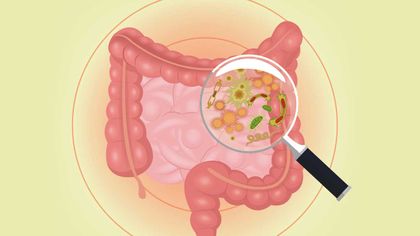
Candida
Candida is the name used to describe a health condition (Candida Related Complex) in which people have an overgrowth of Candida Albicans, a fungus (a type of yeast), in their digestive system. Candida Albicans is actually one of 150 known Candida species, and is a normal part of the micro-flora present in our digestive systems, it usually coexists with the other bacteria and yeasts that make up our gut micro-flora peacefully. However, certain factors can lead to Candida Albicans becoming out of control, with more and faster growing colonies, that start to dominate the gut micro-flora. This is when it can begin to affect your digestion, even damage your intestinal wall, allowing its toxic byproducts to escape into your bloodstream and spread throughout your body, and weaken your immune system.
Most of us (around 70%) have Candida Albicans, and a significant proportion have excess. In fact many sufferers of Candida Related Complex are unaware of their condition and/or remain undiagnosed by their doctors. Candida infections are as many as eight per 100,000 population, with 95% of infections involvign Candida Albicans.
What are the Symptoms?
Unfortunately they can be different in each individual, occuring in different parts of the body, and causing symptoms specific to that individual; this is why it is often misdiagnosed/undiagnosed. Signs and symptoms you may experience include:
Candida Albicans is not usually a pathogen, it only becomes so when there is a disruption in the balance of microorganisms that make up the gut micro-flora. It then takes advantage and rapidly expands it's colonies until they control a large portion of the gut. This is a problem because Candida releases approximately 80 different byproducts, including Acetaldehyde and Uric acid. Acetaldehyde is a potent neurotoxin which causes chronic headaches and brain fog, and was recently classified as a potential carcinogen. Excess Uric acid can cause joint pain and lead to gout due to the build up of uric acid crystals in effected joints. The change in the gut micro-flora can also lead to digestive issues, food allergies and intolerances, yeast infections, and oral thrush. There are many causes of this disruption in micro-flora balance and the consequent Candida overgrowth, but the main ones common to our modern lifestyle include:
Stress weakens your immune system, which unfortunately reduces the ability of the immune defences in the gut to combat Candida overgrowth. Stress also raises blood sugar, which can have several effects, including increasing your craving for foods high in sugar and highly refined carbohydrates. Stress can also effect the motility of your digestive system and reduce your ability to digest food. This can all mean that the microflora, particularly the "good" bacteria, do not get their prefered fuel, which can effect their health and lead to their numbers dwindling.
Antibiotics are designed to kill bacteria, and they do just that, kill any and all bacteria, including the "good" bacteria. A typical healthy adult carries around 100 trillion individual bacteria, that is as many as 500 strains of bacteria, and more cells than our own. Many of these bacteria have important roles in aiding digestion of food and helping maintian an effective immune system. When antibiotics kill these "good" bacteria, they unfortunately do not kill fungi i.e. Candida, leaving it a prime opportunity to colonise the gut.
Nutritional Therapy may be able to assist in getting your level of Candida back under control and prevention of overgrowth, as well as it's signs and symptoms.
Book In Now
Most of us (around 70%) have Candida Albicans, and a significant proportion have excess. In fact many sufferers of Candida Related Complex are unaware of their condition and/or remain undiagnosed by their doctors. Candida infections are as many as eight per 100,000 population, with 95% of infections involvign Candida Albicans.
What are the Symptoms?
Unfortunately they can be different in each individual, occuring in different parts of the body, and causing symptoms specific to that individual; this is why it is often misdiagnosed/undiagnosed. Signs and symptoms you may experience include:
- Digestive issues - e.g. IBS, diarrhoea, bloating, flatulence
- Food allergies/intolerances
- Low mood
- Brain fog
- Headache
- Chronic fatigue
- Joint pain
- Weakened immune system - e.g. recurring infections, colds/flu like symptoms
- Sinus infections
- Recurring yeast infections
- Oral thrush
- Fungal skin and nail infections
- Itching
Candida Albicans is not usually a pathogen, it only becomes so when there is a disruption in the balance of microorganisms that make up the gut micro-flora. It then takes advantage and rapidly expands it's colonies until they control a large portion of the gut. This is a problem because Candida releases approximately 80 different byproducts, including Acetaldehyde and Uric acid. Acetaldehyde is a potent neurotoxin which causes chronic headaches and brain fog, and was recently classified as a potential carcinogen. Excess Uric acid can cause joint pain and lead to gout due to the build up of uric acid crystals in effected joints. The change in the gut micro-flora can also lead to digestive issues, food allergies and intolerances, yeast infections, and oral thrush. There are many causes of this disruption in micro-flora balance and the consequent Candida overgrowth, but the main ones common to our modern lifestyle include:
- Eating a high glycaemic index diet - high in sugar and highly refined carbohydrates
- Prolonged periods of stress - including anxiety disorders; often caused by work, financial, family related and other issues
- Antibiotic use - the most common cause (even just one course)
Stress weakens your immune system, which unfortunately reduces the ability of the immune defences in the gut to combat Candida overgrowth. Stress also raises blood sugar, which can have several effects, including increasing your craving for foods high in sugar and highly refined carbohydrates. Stress can also effect the motility of your digestive system and reduce your ability to digest food. This can all mean that the microflora, particularly the "good" bacteria, do not get their prefered fuel, which can effect their health and lead to their numbers dwindling.
Antibiotics are designed to kill bacteria, and they do just that, kill any and all bacteria, including the "good" bacteria. A typical healthy adult carries around 100 trillion individual bacteria, that is as many as 500 strains of bacteria, and more cells than our own. Many of these bacteria have important roles in aiding digestion of food and helping maintian an effective immune system. When antibiotics kill these "good" bacteria, they unfortunately do not kill fungi i.e. Candida, leaving it a prime opportunity to colonise the gut.
Nutritional Therapy may be able to assist in getting your level of Candida back under control and prevention of overgrowth, as well as it's signs and symptoms.
